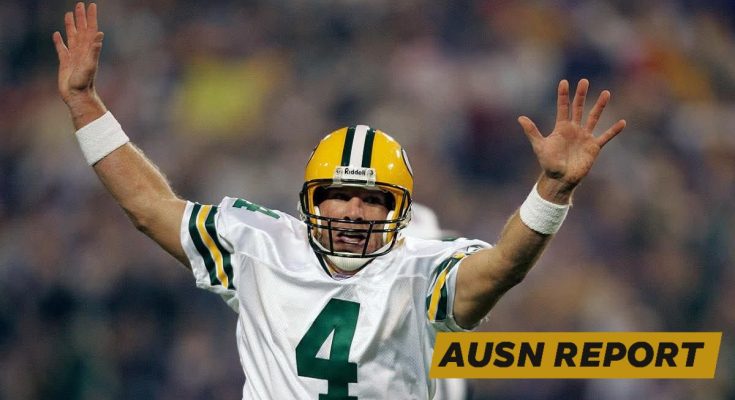Brett Favre’s name is etched forever into the lore of the Green Bay Packers, and even though time has passed since he last took the field in the famous green and gold, his legacy continues to grow with each passing year. He wasn’t just a quarterback; he was a force of nature who defined an era, rewrote record books, and reestablished the Packers as one of the NFL’s premier franchises. When people talk about all-time greats, Favre’s name comes up not just because of his accomplishments but because of the way he played the game. His fearless style, his toughness, his consistency, and his ability to make magic happen on the field are what made him a legend. It’s one thing to be a talented quarterback, but it’s another entirely to embody the spirit of a team and a city. That’s what Brett Favre did in Green Bay, and it’s why his greatness will never be forgotten.
The statistics alone speak volumes about his career. Favre was an 11-time Pro Bowler, a three-time NFL Most Valuable Player, and the quarterback who led the Packers to glory in Super Bowl XXXI. But numbers and accolades, while impressive, only scratch the surface of what he meant to the game and to the fans who watched him every Sunday. He was the epitome of reliability, starting an astonishing 297 consecutive games including playoffs, a streak that stands as one of the most incredible feats in sports history. It wasn’t just that he played—it was that he played at such a high level while battling injuries, personal challenges, and the constant pressures of professional football. The ironman streak alone would cement his legacy, but Favre went far beyond that.
The three consecutive MVP awards in 1995, 1996, and 1997 are perhaps the clearest reflection of how dominant Favre was in his prime. No other player in NFL history has won three straight MVPs, and that fact alone underscores just how much he controlled the league during that stretch. He wasn’t just the best quarterback—he was the best player, period. In those years, Favre’s arm strength, creativity, and leadership elevated the Packers into a powerhouse. Under his guidance, Green Bay transformed from a team searching for relevance into a perennial contender. The Packers had been a proud franchise in the 1960s but had gone through decades of mediocrity before Favre arrived. By the mid-90s, thanks to Favre’s brilliance, Lambeau Field was once again the center of the football universe.
The crowning achievement of his career with the Packers came in the 1996 season, culminating in the Super Bowl XXXI victory over the New England Patriots. Favre threw two touchdown passes in that game and added a rushing touchdown, showing the full breadth of his talent. His performance on that stage was vintage Favre—aggressive, fearless, and electrifying. When he threw a touchdown pass to Andre Rison early in the game and then sprinted down the field with his helmet off, pumping his fist in celebration, it became one of the most iconic images in Super Bowl history. That moment captured who Brett Favre was: a man who played the game with the energy and enthusiasm of a kid in the backyard, yet with the poise and execution of a champion.
For Packers fans, Favre was more than just a quarterback who won games. He was someone who gave the team an identity. His gunslinger mentality meant that every game had the potential for jaw-dropping highlights. He was never afraid to take risks, and while that sometimes led to interceptions, it also led to some of the most spectacular plays fans had ever seen. He had an uncanny ability to throw passes into impossibly tight windows, to extend plays with his movement, and to create something out of nothing. Watching him was never boring, and that sense of excitement was part of what made him beloved. Even when he made mistakes, fans respected the courage it took to attempt those throws in the first place. He played with confidence and charisma, and that confidence spread throughout the team.
His toughness was legendary. Favre played through countless injuries that would have sidelined most other players. Whether it was sprained ankles, sore ribs, or even a broken thumb on his throwing hand, he found a way to be on the field. That toughness wasn’t just physical—it was emotional, too. Perhaps the most memorable performance of his career came on December 22, 2003, the day after his father, Irvin Favre, passed away. Many wondered if Favre would play in the Monday Night Football matchup against the Oakland Raiders. Not only did he play, but he delivered one of the greatest performances of his career, throwing for 399 yards and four touchdowns in a 41-7 victory. That night, the football world watched in awe as Favre played with a combination of grief and inspiration, honoring his father in a way that left fans and fellow players speechless. It was a moment that reminded everyone of the humanity behind the player, and it cemented his status as one of the most admired figures in the sport.
What made Favre even more iconic was his connection with the fans and the city of Green Bay. Unlike players in larger markets, Favre became part of the fabric of a small-town community that lived and breathed football. Lambeau Field was sacred ground, and Favre gave the fans reasons to believe every season. He represented their values—toughness, humility, and passion for the game. He wasn’t just a player they rooted for; he was someone they felt connected to. That bond was so strong that even when Favre’s career ended in a more complicated fashion, with his departure from Green Bay and subsequent stints with the Jets and the rival Vikings, Packers fans eventually embraced him back into the fold. The emotions were raw, but in the end, the respect and admiration for what he accomplished in Green Bay outweighed everything else. When his jersey was retired and he was inducted into the Packers Hall of Fame, the ovations were thunderous, a testament to the enduring love between Favre and the Green Bay faithful.
Favre’s legacy extends far beyond his statistics, but those numbers are staggering in their own right. By the time he retired, he held nearly every major passing record, including most career touchdown passes, most career passing yards, and most career wins by a starting quarterback. While some of those records have since been surpassed, the fact that he set the bar so high speaks volumes about his longevity and excellence. He was also known for his remarkable consistency, leading the league in touchdowns four different times and throwing at least 20 touchdown passes in 12 consecutive seasons. Very few quarterbacks in NFL history have combined durability, production, and success in the way Brett Favre did.
Another aspect of his greatness was his leadership. Favre was the kind of quarterback who made those around him better. Wide receivers flourished in Green Bay because of his ability to get them the ball, often in clutch situations. He had a way of instilling confidence in his teammates, of making them believe that no game was ever out of reach as long as he was under center. His competitive spirit was infectious, and his love for the game inspired those who played with him. Stories from teammates often highlight how much fun he brought to the locker room, whether it was with his famous pranks or his infectious laugh. That joy carried over onto the field, where his passion for football was unmistakable.
Favre’s influence also extended to future generations of quarterbacks. His style of play inspired countless young players who grew up watching him, many of whom went on to become stars themselves. His fearlessness, his creativity, and his willingness to trust his arm gave hope to quarterbacks who didn’t fit the mold of being overly cautious or mechanical. In many ways, the modern NFL, with its emphasis on improvisation and dynamic quarterback play, owes something to Favre. He showed that being a gunslinger could work at the highest level, and he paved the way for quarterbacks who play with a similar flair today.
Even after his retirement, Favre remains a central figure in the Packers’ legacy. His induction into the Pro Football Hall of Fame in 2016 was another moment of celebration for Packers fans, as they watched one of their own officially join the ranks of football immortals. That weekend was filled with stories and reflections about his career, reminding everyone of the incredible journey that began with a trade from the Atlanta Falcons to Green Bay in 1992 and culminated in one of the greatest careers ever. His Hall of Fame speech, filled with gratitude and humility, was a perfect capstone to his career.
To remember Brett Favre is to remember an era of Packers football that was defined by excitement, resilience, and greatness. He restored the pride of a franchise, gave fans unforgettable memories, and established himself as one of the greatest quarterbacks the game has ever seen. His 11 Pro Bowl selections, his three consecutive MVPs, and his Super Bowl championship only scratch the surface of his story. What truly made him great was the way he played the game—with heart, with courage, and with an unwavering love for football. Green Bay has had many legends in its history, but Brett Favre stands tall among them, not just as a player but as an icon who will forever be remembered with a smile, a cheer, and a nod of respect. He wasn’t perfect, and that was part of his charm. He was real, he was raw, and he was unforgettable. Always remember just how great Brett Favre was with the Packers, because his legacy is not just about wins or stats—it’s about the spirit he brought to the game and the everlasting bond he created with an entire football community.



